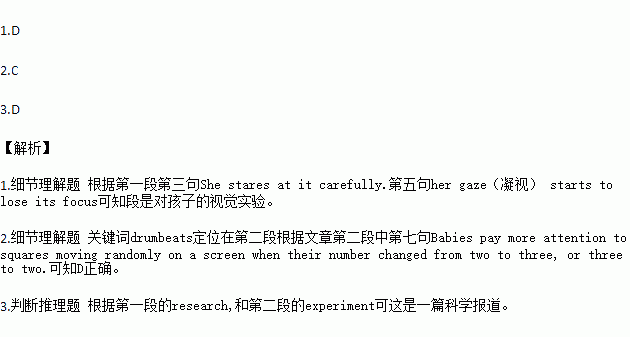题目内容
D
The baby is just one day old and has not yet left hospital. She is quiet but alert (警觉). Twenty centimeters from her face researchers have placed a white card with two black spots on it. She stares at it carefully. A researcher removes the card and replaces it by another, this time with the spots differently spaced. As the cards change from one to the other, her gaze(凝视) starts to lose its focus — until a third, with three black spots, is presented. Her gaze returns: she looks at it for twice as long as she did at the previous card. Can she tell that the number two is different from three, just 24 hours after coming into the world?
Or do newborns simply prefer more to fewer? The same experiment, but with three spots shown before two, shows the same return of interest when the number of spots changes. Perhaps it is just the newness? When slightly older babies were shown cards with pictures of objects (a comb, a key, an orange and so on), changing the number of objects had an effect separate from changing the objects themselves. Could it be the pattern that two things make, as opposed to three? No again. Babies paid more attention to squares moving randomly on a screen when their number changed from two to three, or three to two. The effect even crosses between senses. Babies who were repeatedly shown two spots became more excited when they then heard three drumbeats than when they heard just two; likewise (同样地)when the researchers started with drumbeats and moved to spots.
1.Babies are sensitive to the change in______.
A. the size of cards
B. the colour of pictures
C. the shape of patterns
D. the number of objects
2.Why did the researchers test the babies with drumbeats?
A. To reduce the difficulty of the experiment.
B. To see how babies recognize sounds.
C. To carry their experiment further.
D. To keep the babies’ interest.
3.Where does this text probably come from?
A. Science fiction.
B. Children’s literature.
C. An advertisement.
D. A science report.

